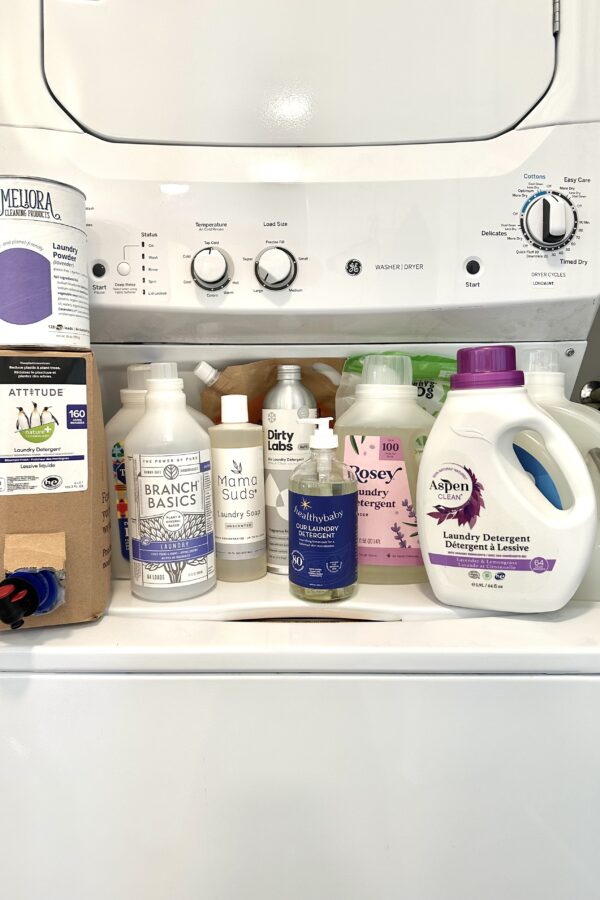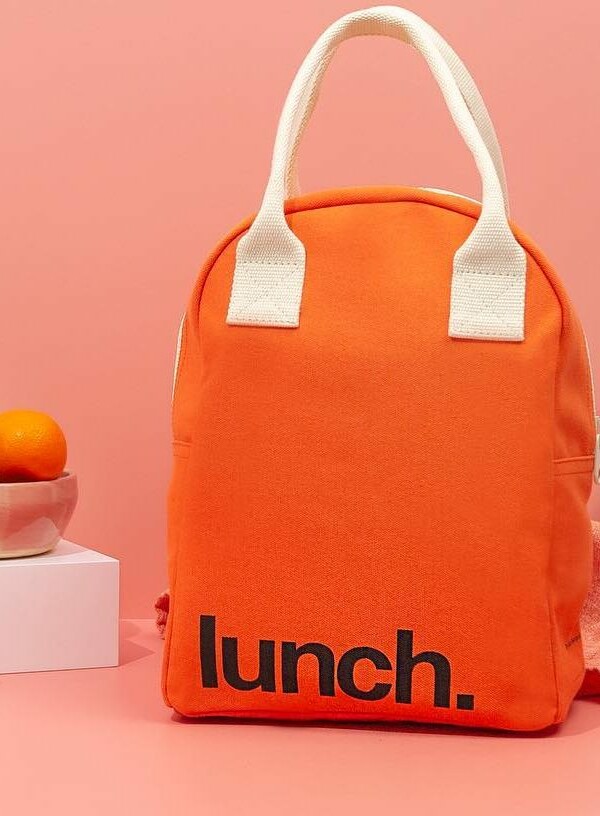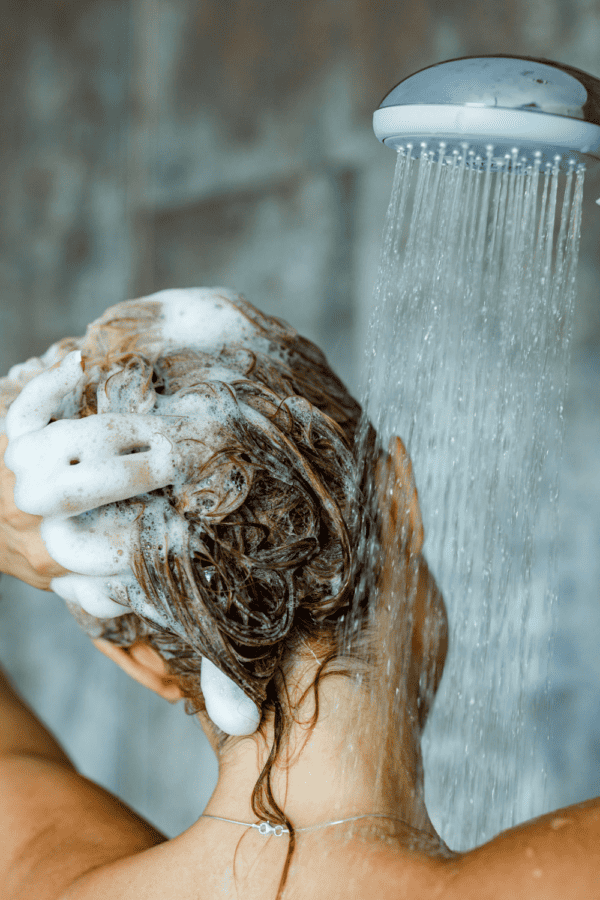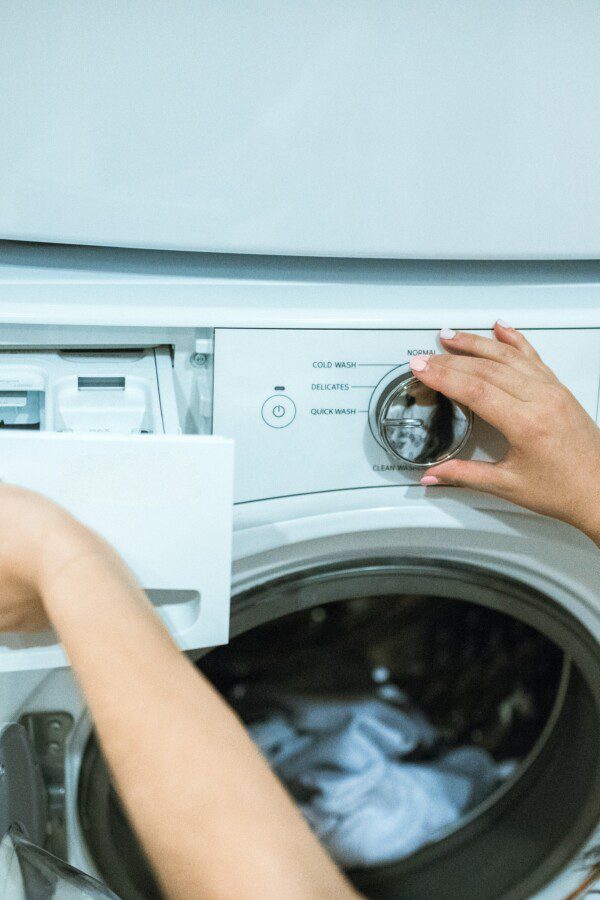Whether you’re looking for the best natural fabric softener alternatives or simply want to upgrade your laundry routine with some high-performing non-toxic fabric softeners, we’ve got you. Let’s go over the many homemade fabric softener options and find out which organic fabric softener alternatives are really worth the hype.
Table of Contents
- Best Non-Toxic Fabric Softener Brands + Natural Fabric Softener Alternatives
- Do You Need To Use Fabric Softener?
- The Toxic Chemicals In Fabric Softeners
- 2 Best (Kind of) Non-Toxic Fabric Softeners
- 7 Eco-Friendly & Non-Toxic Fabric Softener Alternatives
- DIY Natural Fabric Softener Recipe
- Grab a clean glass jar or container with a tight-fitting lid.
- Pour 2 cups of white vinegar into the jar.
- If desired, add 20 drops of your favorite essential oil to the jar.
- Seal the jar tightly with the lid and give it a gentle shake to mix the vinegar and essential oil (if using).
- When you’re ready to do your laundry, give the jar another shake to ensure the ingredients are well combined.
- During the rinse cycle of your washing machine, pour about half a cup of your DIY fabric softener into the fabric softener compartment.
- Let your washing machine finish its cycle as usual, and—voila! Your laundry will come out feeling soft and smelling fresh.
- Wrapping Up: Non-Toxic Fabric Softener Brands & Natural Fabric Softener Alternatives
This article contains affiliate links, which means we may earn commission if you decide to make a purchase.
Best Non-Toxic Fabric Softener Brands + Natural Fabric Softener Alternatives
As someone “blessed” with overly-sensitive skin, I’ve come to understand the power of simplicity. It didn’t take too long to realize that using fewer, milder ingredients is the secret to maintaining a blissful relationship between my skin and me. So when it comes to laundry detergent, home cleaning products, skincare, textiles, and even fabric softener alternatives, I tend to avoid synthetic chemicals. And, frankly, I’m not alone in this.
In reality, some studies say that around 40% of adults have sensitive skin. That’s an increase of 55% in just two decades!
It’s not just about nasty skin irritations, either. Most of us are simply looking for products with less of an environmental impact when it comes to ingredients and packaging.
So the question arises: do I really need all these extra products? Laundry detergent and prewash, stain and spot removers, fabric refreshers and softeners, anti-static and anti-wrinkle products, laundry starch and fabric finishes, etc.
Would it be better to have a natural, eco-friendly, and minimalist laundry routine with just a few products that do the trick? No potentially toxic chemicals, no excessive packaging… and less money spent, too!
So, in this guide, we’re going to talk about whether you really “need” fabric softener, what it’s good for, and what it’s not. And what about non-toxic fabric softener options? Should the best natural fabric softener choices be a part of your laundry routine? Or, is it time to look for natural fabric softener alternatives? How about ditching everything altogether? Let’s get into it.
Do You Need To Use Fabric Softener?
Ah, the great fabric softener debate! Let’s tackle this question first.
The truth is, you don’t necessarily need to use fabric softeners to achieve soft and comfortable clothes. To understand why, it’s helpful to know how fabric softeners work.
The “active” ingredients agents in fabric softeners help to relax and loosen the fibers in fabrics, resulting in a more luxurious and comfortable feel. They also help reduce static electricity. Static cling occurs when clothes rub against each other, creating friction and causing them to stick together. Fabric softeners work to “neutralize” the charges and minimize static, making it easier to separate garments and reducing the annoying clinging effect.
So, while you don’t really “need” fabric softeners, many people do find them convenient. No one likes to get shocked by their clothes while they’re folding them!
That said, there are fabric softener alternatives that are not only kinder to the environment but also safer for your skin, better for people with respiratory sensitivities, and less impactful on your indoor air quality.
It’s also worth noting that not all fabrics require fabric softeners. Many natural fibers, such as cotton, linen, and hemp, tend to soften naturally with repeated washing and use!
So, if you’re looking to reduce your ecological footprint and create a healthier living space, you could either skip the fabric softeners altogether, choose a non-toxic fabric softener, or try out one of the fabric softener alternatives below!
Is Fabric Softener Bad For Clothes?
So we know we don’t need fabric softener, but could it actually be counterproductive, decreasing the durability and longevity of our clothes?
Fabric softeners can leave a thin coating of residue on fabrics. While this residue can contribute to the soft and smooth feel of clothes in the short term, it can build up over time, affecting the absorbency and breathability of the fabric fabric.
Some fabrics, particularly things like towels, rely on their natural absorbency to function effectively. Fabric softeners can reduce the absorbency of these fabrics, resulting in reduced overall efficiency and effectiveness.
It can also decrease the moisture-wicking properties of some fabrics as well, which can cause problems for things like activewear.
While fabric softeners can provide a softer feel, some argue that the chemicals in fabric softeners may cause fabrics to actually loose their “fluffiness” over time, lowering the quality of the garment and potentially the overall longevity.
And it’s not just your clothes and towels you have to worry about, but your washing machine, too! Those chemical coatings that can build up on your fabrics can also build up in your washing machine and pipes. This can lead to mold growth, decreased washing efficiency, and even potential malfunctions in the future.
The Toxic Chemicals In Fabric Softeners
Most conventional fabric softeners rely on harsh chemicals. That’s why we’ll always put our trust in natural fabric softener alternatives and the few non-toxic fabric softener options available on the market. But, more on that in a minute. For now, here are some of the most toxic chemicals found in fabric softeners so you know what to look out for:
Quaternary Ammonium Compounds (Quats): Quats, such as benzalkonium chloride or distearyldimonium chloride, are commonly used as antistatic agents in fabric softeners. (They are also used as antibacterials in other types of products, such as hand sanitizers.) They have been linked to skin and respiratory irritation and may also contribute to the development of antibiotic resistance in bacteria.
Phthalates: In fabric softeners, phthalates are often used to make fragrances last longer on the fabric. They won’t be listed on the ingredient label because they will be hidden under the “fragrance loophole.” Phthalates are endocrine disruptors that have the potential to cause reproductive and developmental problems, as well as cancer.
Hidden Fragrance Ingredients: Speaking of the fragrance loophole… The fragrances in fabric softeners are typically composed of *mystery* chemicals, which can include endocrine-disrupting chemicals (such as the phthalates mentioned above), carcinogens, and allergens. Not all fragrance chemicals are toxic, but choosing a “fragrance-free” fabric softener can be one easy way to decrease your exposure to certain chemicals.
Ethanolamine Compounds: These compounds, including diethanolamine (DEA), monoethanolamine (MEA), and triethanolamine (TEA), are used as pH adjusters in fabric softeners. They can react with other chemicals present in the environment to form potentially harmful substances like nitrosamines, which are associated with adverse health effects.
So, all that under consideration, why not go with an eco-friendly and non-toxic fabric softener (or one of the many natural fabric softener alternatives) that offer a safer and more environmentally conscious approach to achieving fresh and soft laundry?
2 Best (Kind of) Non-Toxic Fabric Softeners
Skipping the fabric softener altogether is the best option, and we recommend choosing a safer fabric softener alternative from the options below. But if you definitely want to use a fabric softener, then some brands are better than others.
There are actually only a couple of pre-made non-toxic fabric softeners that we recommend at this time. These are the “best” fabric softeners at this time, but it’s still worth noting that even these are not perfect.
1. Truly Free


Truly Free’s fabric softener is formulated to tackle tough stains, loosen bunched-up clothing, and combat the effects of hard water.
It comes in scented and unscented versions. The “Signature Scent” option is infused with essential oils and plant-based fragrance oils, including orange, lavender, clove, and more. It not only delivers the softness you crave from conventional fabric softeners, but also leaves a gentle, refreshing scent that lingers throughout the day. These oils aren’t a problem for most people, but those with allergies or very sensitive skin might want to go with the Unscented version instead.
It’s worth noting, however that this softening rinse is made with lauryl trimethyl ammonium chloride, which is not ideal, especially for folks with allergies, asthma, or skin sensitivities. But again, if you’re set on using a fabric softener, then this is one of the least bad ones I’ve been able to find.
After receiving your initial container, future purchases come in convenient refill pouches in order to reduce plastic. By making this change, Truly Free has already prevented over 3 million single-use plastics from ending up in landfills.
Use code THEFILTERY for 30% off your order.
2. 9 Elements
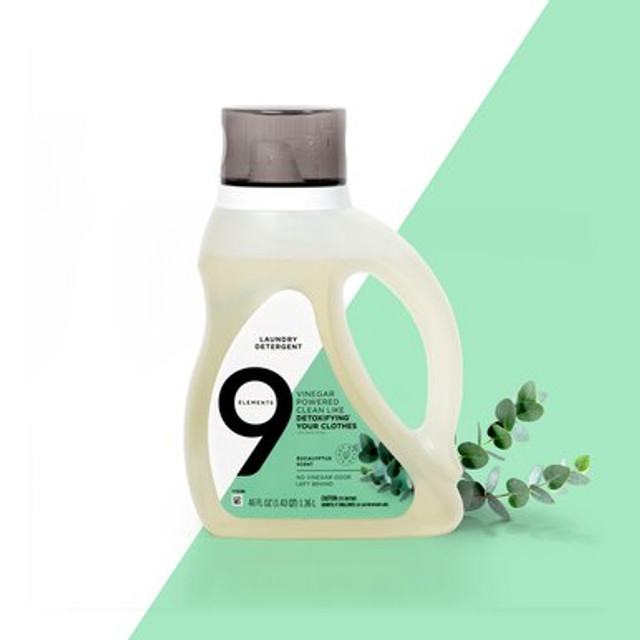

Up next is the 9 Elements natural fabric softener. Available in Lemon and Eucalyptus scents, this formula works differently from traditional softeners. It works to “purify” fabrics by eliminating trapped hard water metals and odors that can make them appear faded and feel stiff. The vinegar-powered formula strips away trapped residues and odors, leaving behind no trace of vinegar odor.
As mentioned, the ingredient list here isn’t perfect (for example, it contains ethoxylated ingredients, which isn’t ideal), but it’s still better than most other fabric softeners on the market.
You can check out our full brand review of 9 Elements right here.
7 Eco-Friendly & Non-Toxic Fabric Softener Alternatives
When it comes to fabric softening, you don’t have to rely on conventional fabric softeners laden with potentially harmful chemicals. There’s a world of eco-friendly, non-toxic fabric softener alternatives out there that can leave your clothes feeling soft, fresh, and cozy. And they’re easy, too!
One quick disclaimer before we get started, though. When using the fabric softener alternatives below (especially for the first time), make sure you do a quick search to make sure it’s okay to use that specific ingredient with your washing machine and/or the specific type(s) of fabric you’re washing. For example, baking soda should not cause any harm to most types of washing machines when used in moderation, but overdoing it could cause buildup.
1. Vinegar
This pantry staple isn’t just for cooking! White vinegar is a remarkable (and cheap!) natural fabric softener. Simply add half a cup of vinegar to your rinse cycle and let it work its magic. Vinegar helps break down residue, reduce static, and leave your clothes feeling soft and cuddly. Don’t worry about the vinegar smell—it dissipates during drying, leaving your laundry odor-free.
2. Baking Soda
Known for its versatility, baking soda can also be used as a homemade fabric softener. Add half a cup of baking soda to your laundry load during the wash cycle. It helps neutralize odors, soften fabrics, and reduce static cling. Plus, it acts as a natural deodorizer, leaving your clothes smelling fresh and clean.
3. Dryer Balls

Wool dryer balls are eco-friendly superheroes for your laundry routine. Toss a few of these fluffy balls into your dryer, and watch them work their magic. Dryer balls naturally soften fabrics, reduce wrinkles, and minimize static cling. As they tumble around, they help improve airflow and shorten drying time. They’re reusable, chemical-free, and gentle on the environment—what’s not to love?
Here are a few places to buy wool dryer balls:
– Coyuchi
4. Aluminum Foil
You heard that right! Surprisingly, aluminum foil can help soften your clothes and reduce static. Simply roll up a sheet of aluminum foil into a ball and toss it into the dryer with your laundry. It helps create gentle friction that softens fabrics and prevents static cling. This hack is a handy trick when you’re in a pinch and looking for natural fabric softener alternatives that can do the trick.
4. Hair Conditioner
If you have a bottle of hair conditioner that you no longer use, give it a new purpose as a non-toxic fabric softener. Mix a small amount of hair conditioner with water to dilute it. Then, add this DIY fabric softener to your rinse cycle or use it in a spray bottle as a fabric mist. The conditioner’s emollient properties will leave your clothes feeling luxuriously soft and smelling good, too.
6. Epsom Salt
Epsom salt, known for its relaxation benefits, can also enhance your laundry routine. Add half a cup of Epsom salt to your wash cycle along with your detergent. The salt helps soften water, which in turn softens your fabrics. It’s a natural and inexpensive way to achieve that desired plushness in your clothes.
You can even combine multiple of these ideas if you want to! For example, you might use some vinegar during the rinse cycle and then dryer balls in the dryer to combine their effects.
DIY Natural Fabric Softener Recipe
Ready to DIY your own homemade fabric softener? Here’s how to do it.
What you’ll need:
– 2 cups of white vinegar
– 20 drops of your favorite essential oil (optional)
Grab a clean glass jar or container with a tight-fitting lid.
(Glass is ideal as it won’t interact with the ingredients.)
Pour 2 cups of white vinegar into the jar.
(As mentioned above, vinegar works wonders as a fabric softener and helps to eliminate odors.)
If desired, add 20 drops of your favorite essential oil to the jar.
(This step is optional but will infuse your laundry with a lovely scent. Popular choices include lavender, lemon, or eucalyptus.)
Seal the jar tightly with the lid and give it a gentle shake to mix the vinegar and essential oil (if using).
When you’re ready to do your laundry, give the jar another shake to ensure the ingredients are well combined.
During the rinse cycle of your washing machine, pour about half a cup of your DIY fabric softener into the fabric softener compartment.
If your machine doesn’t have a fabric softener compartment, you can add it directly to the rinse water.
Let your washing machine finish its cycle as usual, and—voila! Your laundry will come out feeling soft and smelling fresh.
Some things to keep in mind:
- Remember, the vinegar scent will disappear as your laundry dries, leaving behind a clean, odor-free freshness. So don’t worry if you don’t like the vinegar smell as you put it into the washing machine.
- Feel free to experiment with different essential oils to create your signature scent blend.
- Shake the jar before each use to ensure the ingredients are well mixed.
Wrapping Up: Non-Toxic Fabric Softener Brands & Natural Fabric Softener Alternatives
So there you have it—the best natural fabric softener alternatives and non-toxic fabric softener options in 2023. By stepping away from conventional fabric softeners filled with synthetic chemicals, you’ve discovered the wonders of vinegar, baking soda, dryer balls, aluminum foil, hair conditioner, and Epsom salt.
These natural ingredients and simple hacks offer a safer, gentler, and more sustainable way to achieve softness and freshness in your laundry. So go ahead and give these natural and organic fabric softener alternatives a try!

